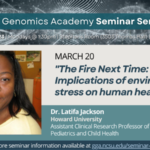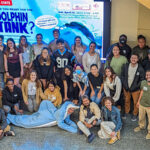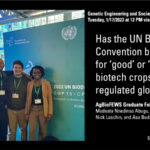
Welcome Back Lunch | GES Colloquium
The Genetic Engineering and Society Colloquium is a seminar series that brings in speakers to present and stimulate discussion on various topics related to existing and proposed biotechnologies and their place within broader societal changes....
GES Colloquium, Fall 2023
The Genetic Engineering and Society Colloquium is a seminar series that brings in speakers to present and stimulate discussion on various topics related to existing and proposed biotechnologies and their place within broader societal changes....
GGA Seminar with Dr. Latifa Jackson – Decolonizing Human Genetic Research Workshop Series
Leveraging computational scale data, studies show that socioeconomic, psychological, and biological factors contribute to immune weathering in young adults, and recent research suggests that violence and other adverse experiences may be affecting biological stress responses in African Americans. Hosted in collaboration with BAA (Being an Ally in Academics). ...
Fireside Chat with Dr. Latifa Jackson – Decolonizing Human Genetic Research Workshop Series
As part of a two-day engagement, Jackson will join us for a “fireside chat” and Q&A session to answer your questions about her research on the effect of sexual and racial discrimination on human health, her work with the 1,000 African-American Genomes Project, her career path, and more. Hosted in collaboration with BAA (Being an Ally in Academics). ...
Why do we love cats and hate rats?
By NC State Libraries News | Why do we dote on parakeets but not pigeons? Why do we let cats curl up on our laps but catch rats in traps? Science writer Bethany Brookshire, author of the new book Pests: How Humans Create Animal Villians visits NC State on April 4th....
SPECIAL GUEST: Dr. Bethany Brookshire – Don’t Dumb it Down, and Other Science Writing Tips and Tricks | GES Colloquium [In-Person]
What are the different kinds of science writing for the public, and how on earth do you do them? Science writer Bethany Brookshire will pull back the curtain....
Kiera O’Donnell – Understanding the Dynamics of Post-Hurricane Shoreline Protection Decisions | GES Colloquium (ZOOM)
Insights into the complex factors that shape people's perceptions of their environment and their decisions around shoreline protection....CANCELED – Brian Donovan GES Colloquium to be rescheduled in Fall 2023
Note that the GES Colloquium on 4/18/23 with Brian Donovan of BCBS Science Learning has been canceled and will be rescheduled for the fall of 2023....Continue reading "CANCELED – Brian Donovan GES Colloquium to be rescheduled in Fall 2023"

AgBioFEWS Cohort 3 – Lessons teaching Responsible Research and Innovation principles | GES Colloquium [IN-PERSON]
Final GES Colloquium of the spring semester! AgBioFEWS students will discuss their experiences teaching Responsible Research and Innovation principles to undergraduates during a recent Dolphin Tank workshop. Note, this seminar will be held IN PERSON in 1911 Building, Room 129, and will not be recorded....
Sebastián Zarate and Jill Furgurson – 4S 2022 Cholula: Reunion, recuperation, reconfiguration | GES Colloquium
The 2022 Annual 4S conference brought together researchers and practitioners to explore science, technology and innovation across different cultural, economic and social settings....
Has the UN Biodiversity Convention been a force for ‘good’ or ‘evil’ in how biotech crops are regulated globally? | GES Colloquium
AgBioFEWS Fellows Asa Budnick, Nick Loschin, Joseph Opoku Gakpo and Modesta Abugu will share their observations on and interrogate practices at the UN Biodiversity Conference (COP15) in Montreal, Canada that eventually lead to global decisions on the governance of biotech crops....
The Challenges, Successes, and Sustainability of NRT FEWS programs | GES Colloquium
Panel: Drs. Karletta Chief (University of Arizona), Yael Perez (University of California-Berkeley), and Amy Sapkota (University of Maryland). Joining us from three different NSF research traineeships on food, energy, and water systems (FEWS), our panelists will share each programs' challenges, opportunities, and sustainability....
Jonathan Allen and Rebecca Brown – Food sciences, technology, and globally sustainable food systems | GES Colloquium [In-Person]
Where the food science and nutrition communities have come and may be going in defining sustainable food systems with examples from research in the NC State Food, Bioprocessing and Nutrition Department. ...
Karen Maschke – Nonhuman Animals Containing Human Cells: Ethics and Oversight | GES Colloquium, Spring 2023
This presentation focuses on ethical and oversight issues as they relate to the insertion of human cells into nonhuman animals, e.g., “chimeric research.” ...
Fernanda Santos – GE Foods Regulation – The U.S. Way | GES Colloquium
This discussion aims to give participants some thought-provoking information on how food is generally regulated in the U.S., in addition to a general overview of the process utilized by the regulatory bodies to approve genetically engineered foods for human consumption. ...Continue reading "Fernanda Santos – GE Foods Regulation – The U.S. Way | GES Colloquium"